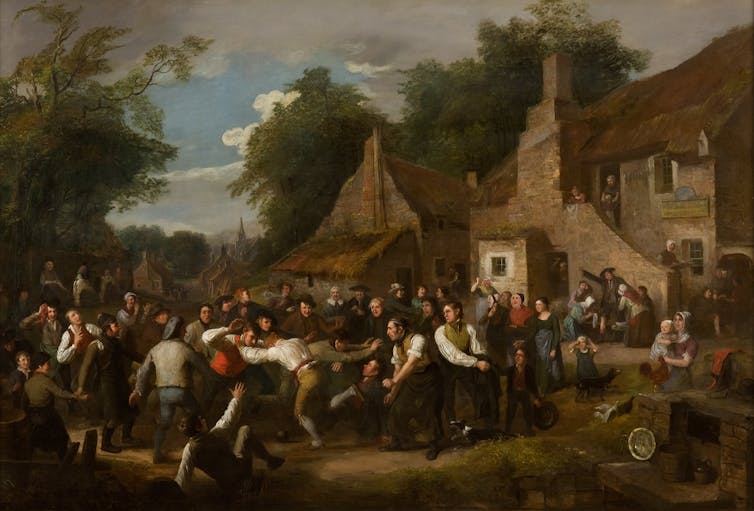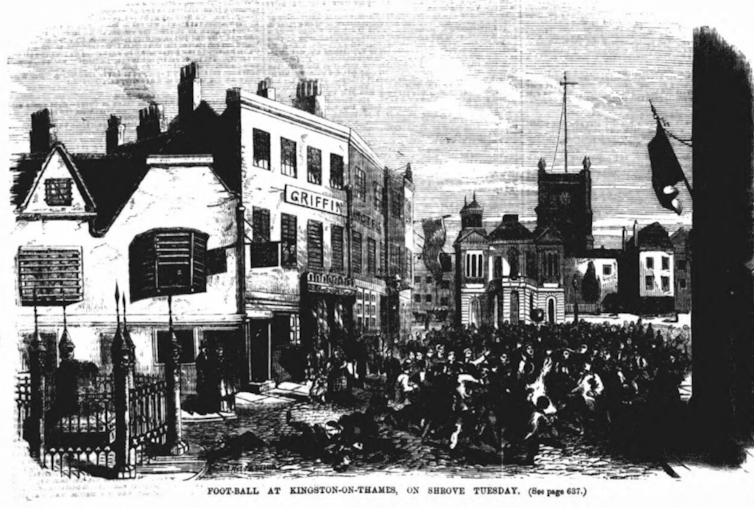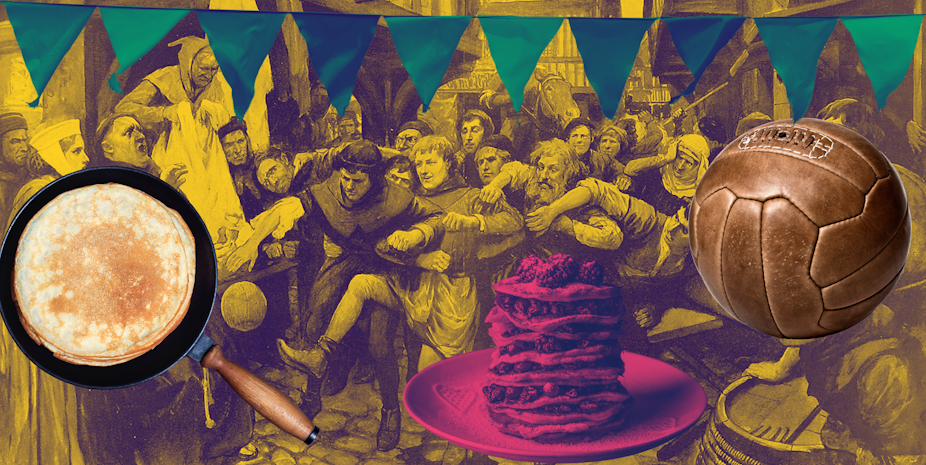Pancake Day, or Shrove Tuesday is once again upon us. Celebrated in many countries around the world, for Christians, Shrove Tuesday marks the last day, or the feast day before Lent - the 40 days leading up to Easter.
This is traditionally a time of abstinence associated with clearing your cupboards of things like eggs, sugar and fats. Pancakes are eaten on this day to use up these foods before the fasting season of Lent begins.
But Shrove Tuesday isn’t just about pancakes. Indeed, historically in the UK, it formed part of a more elaborate pre-Lent festival called Shrovetide, which was all about feasting and sports.
Shrovetide games ranged from cruel animal blood sports like cock-fighting to tug-o-wars and skipping. Yet no Shrovetide sport was more widespread and longstanding than football.
Read more: The science behind making a perfect pancake

According to players from Duns, a town in the Scottish Borders, in 1686, it was “an ancient custom throughout all this kingdom to play at football upon Fastens Eve (Shrove Tuesday)”.
Shrovetide ball games are documented from the 12th century onwards, in scores of communities throughout Britain and northern France – several of which in England and Scotland still play it today. Shop windows are boarded up and businesses are closed for the day as whole towns take to the streets to join in the annual Shrovetide football game.
Shrove football
As ancestors to our modern games, folk football matches varied considerably in the manner of play. But generally, players contested a ball with hand and foot, usually towards a goal.
Shrovetide games were often the big matches of the day, featuring sometimes hundreds of participants. Whether town versus country, or married against bachelors, teams battled to move the ball through streets and countryside, towards goals like mills, streams or even the church.
Due to its destructive potential, football often fell foul of authority and was banned outright. Medieval royal prohibitions called it “vain, unthrifty and idle”, while Puritans deemed it “a bloody and murdering practise”. But others in power obviously saw its appeal, to judge from its festive sponsorship in many cities and towns.
In Chester, for example, every Shrove Tuesday in the early 16th century, the Merchant Drapers’ Company received a football from the Shoemakers’ Company, a wooden ball from the Saddlers’ Company and a small silk ball from each man from the city married within the last year. Under the mayor’s supervision, the Drapers tossed up the balls (which doubled as prizes) for the craftsmen and crowd to play from the common field to the city’s Common Hall.
Chester’s Shrovetide sponsorship was mirrored throughout the British Isles. Craftsmen and guilds played key roles as participants and providers of the ball(s). On Shrove Tuesday 1373, for example, skinners (who skin animals) and tailors played in the streets of London. Butchers did the same in Jedburgh, Scotland.
While in the late 18th century in the market town of Alnwick in Northumberland, England, the Skinners’ and Shoemakers’ companies paraded the ball to the match between married and bachelor men. Indeed, leather workers like shoemakers were especially important, crafting Shrovetide footballs in 15th-century London, 16th-century Glasgow and 17th-century Carlisle.
An ancient custom
Newlyweds also fronted the ball in many communities. In Dublin, recently married men had to present a ball to city magistrates every Shrove Tuesday during the 15th and 16th centuries. Newlywed members of trade guilds in Perth in central Scotland, and Corfe Castle in Dorset also paid a Shrovetide “football due”, while a similar custom seems to have existed in medieval London.
These were part of a broader folk tradition, where newly married couples owed a “bride ball” or “ball money” to their community. Since weddings were customary during Shrovetide (and prohibited in Lent), it was an ideal time to collect this money. Local governments would gather the “wedding ball” dues, hire drummers and pipers to pump up the crowds, or pay for the footballs directly.

Failure to pay your football dues could result in imprisonment, heavy fines or the forced closing of a craftsman’s shop. These harsh consequences reflect the worth of Shrove Tuesday football to these communities. To them, it was not a “vain and idle” game, but an “ancient and laudable custom” of “goodly feats and exercise” where participation was often obligatory.
Officials thus sponsored games that were technically illegal because Shrovetide football equated with the “common wealth of the city”. Participation and patronage of the game reinforced the status and privilege that came with civic membership.
Gradually, authorities in most major cities did withdraw their support from Shrovetide football. Some cities like St Andrews in Scotland simply banned it because of the “many ills” and “disorder”.
Others “reformed” the games into less dangerous entertainments, like foot and horse races in 1540s Chester, or a fire-engine display in 1725 in Carlisle. By the middle of the 18th century, officially sanctioned Shrovetide ball games were mostly confined to smaller market towns and villages, which is where some live on to this day.
So as you reach for the batter this Shrove Tuesday, remember the history of the riotous game we call football and its lesser-known origins as a prelude to pancakes.

